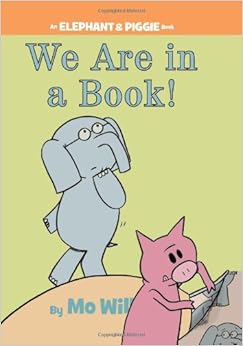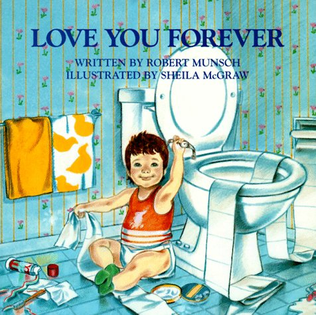WE ARE IN A BOOK: by Mo Willems
Willems, M. (2010). We Are in a Book! Singapore: Hyperion Books for Children.
We Are in a Book! is about two friends, Elephant Gerald and Piggie. Gerald is startled to find someone is watching them. Fearing it is a monster, Gerald panics, but Piggie soon tells him that it is really a Reader. At first, Gerald and Piggie are delighted to find a reader, even playing jokes on the reader by making the reader say "Banana", which both find uproariously funny. However, Gerald panics again when told all books, including the one they are in, end. Gerald has more to do, more "bananas" to have the reader say. Piggie comes up with a solution to this terrible crisis: he and Gerald ask the reader to read them again.
I really enjoyed We Are in a Book! because it is fully self-aware. It treats the situation excellently by having Gerald and Piggie be 'real', as if their existence is separate from the book, as if they were independent. By acknowledging that they are being read, there is an immediate sense of communication between the Reader (that would be us) and the characters (Gerald and Piggie).There's a little bit of innocent mischief with Gerald and Piggie, who delight in 'making fun of us' by having us say "Banana". I imagine children who are easily amused with funny-sounding words can relate to the fun Gerald and Piggie have with "banana".
The illustrations are also brilliant. When Gerald and Piggie 'come closer' to investigate, the reader seems them larger than when they are barely recognizing us. We also get an idea as to what kind of being Gerald and Piggie are. Gerald, with his glasses, is the more innocent of the pair. He was completely unaware of who could be 'reading' them, or that books end. He freaks out and makes a simple appeal to us. "I just want to be read". Willems does an extremely shrewd thing in making the text to this smaller than the normal words in the bubble (which Piggie acknowledges allow him to 'speak') and larger (as when they find "banana" so hilarious). It gives us the reader an indication of how it is spoken, whether loudly (as when they laugh) or softer (as with Gerald's sad plea).
I can't remember where, but I think it was on NPR that I heard talk about We Are in a Book!, and how it is almost existentialist in how Gerald and Piggie recognize that 'all things end' and are fully aware that their existence does not extend to anything outside the book they are in. When the book closes, they cease to exist. I don't know about that. I do know that We Are in a Book! is a really delightful read. It is simple ('banana' being the biggest word), it has a cute and fun story, and it is intelligent in that it makes the reader part of the story.
I enjoyed not just We Are in a Book! on the surface level, but also on the fact that it is self-aware. It made me think also of another book, Winston the Book Wolf. Both trust the reader to understand what is going on. Winston the Book Wolf uses the traditions of the Little Red Riding Hood story (the little girl is called Rosie, but she wears a red hoodie and Winston asking to wear Grandmama's clothes to enter the library as "Granny Winston") and The Three Little Pigs are in the background. We even get some great inside jokes parents might appreciate, like the hot dog vendor looking suspiciously like Oliver Hardy. The ending similarly invites the reader to be a conspirator of sorts, suggesting to us that if the Story Lady at our library "wears long skirts and floppy hats", she may be a wolf in disguise.
I really found We Are in a Book! bright, clever, amusing, and I think entertaining for children. I think they will appreciate the humor of the situation, and find Gerald and Piggie amusing and endearing.
GLADLY, GERALD AND PIGGIE. GLADLY.








